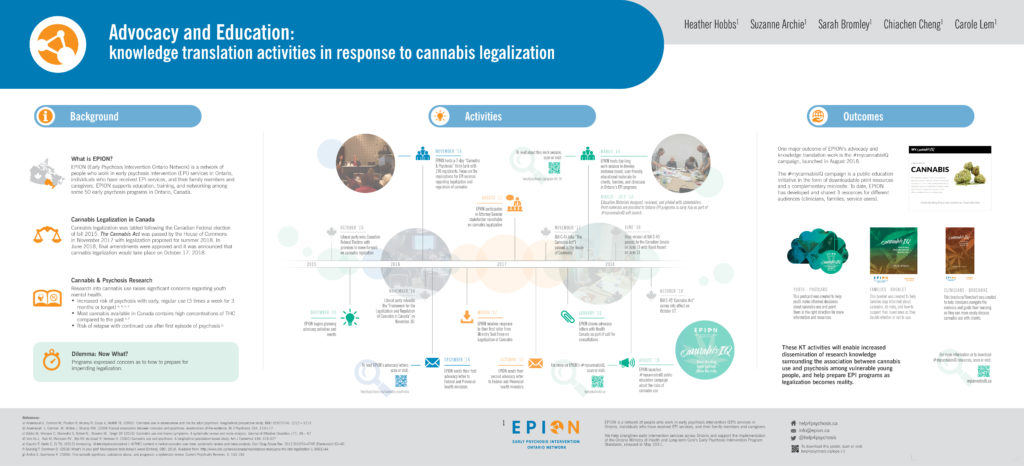News & Updates
EPION at IEPA 11 in Boston MA
EPION is proud to be participating in the 11th International Conference on Early Intervention in Mental Health taking place in Boston, Massachusetts, USA, 7th–10th October 2018.
EPION’s representatives will be presenting one poster and one symposium session.
Monday October 8, 2018
@ 11:30am, Essex Ballroom:
Hobbs et al, Poster A77 (click to view abstract)
Hobbs H; Archie S; Bromley S; Cheng C; Lem C. (October 2018) “Advocacy and Education: knowledge translation activities in response to cannabis legalization.” The 11th International Conference on Early Intervention in Mental Health (IEPA 11). Boston, MA. Poster A77.
Download poster file: Hobbs H; Archie S; Bromley S; Cheng C; Lem C. (October 2018) “Advocacy and Education: knowledge translation activities in response to cannabis legalization.” (IEPA 11)
Tuesday October 9, 2018
@ 2:45 – 4:15 pm, American Ballroom – South:
Symposium Session 17, Talk 3 (click to view abstract)
Durbin J; Selick A; Langill G; Addington D; Cheng C. (October 2018) “Conducting Fidelity Assessments in Ontario Early Psychosis Intervention Programs: Evaluation of a Pilot Implementation Initiative.” The 11th International Conference on Early Intervention in Mental Health (IEPA 11). Boston, MA. Symposium Session 17, Talk 3.
Ontario Canada is home to about 50 Early Psychosis Intervention (EPI) programs, and a sector wide network of providers (EPION – Early Psychosis Intervention Ontario Network) who work collaboratively to improve quality of care. Ontario released EPI program standards in 2011 but adherence is unknown. In the fall of 2016, EPION partnered with Centre for Addiction and Mental Health (CAMH) to pilot a novel fidelity review process using the First Episode Psychosis Fidelity Scale (FEPS-FS). Three-person assessor teams of volunteer EPI staff (2) and CAMH implementation specialists (1) conducted 2-day site visits to assess fidelity. Assessor teams were supported through training, tailored data collection tools and post-visit rating consensus meetings with an expert. Fidelity reports included quality improvement suggestions as well as fidelity ratings and related explanations. Nine programs were reviewed. Qualitative data were collected from assessors and sites to assess value, feasibility, and quality of this fidelity assessment process. Overall feedback was positive. Assessor team members brought complimentary skills to the process. Programs valued having front line assessors who understood the clinical experience, and assessors valued learning about and from peer programs. The process required a steep learning curve, but assessor confidence increased with their second review. Using a validated, standardized scale gave weight to the assessment although some adaptations may be needed for Ontario context. Some rating challenges were encountered, and the time commitment was greater than expected. In our presentation we will further discuss Ontario-specific challenges and explore feasibility of continuing this approach.




